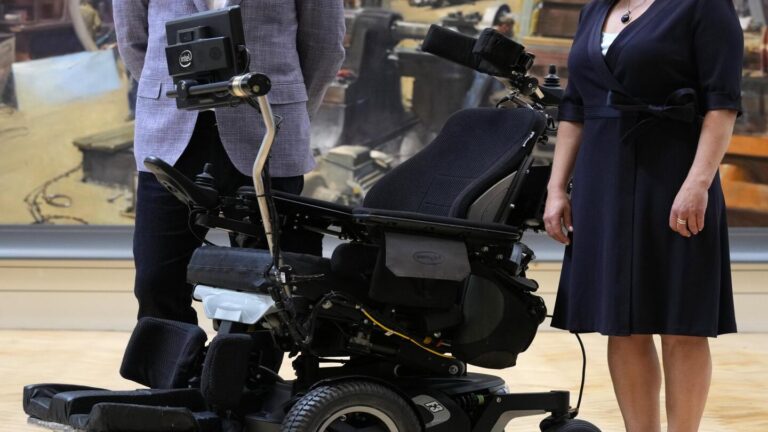LONDON (AP) — London’s Science Museum and Cambridge University Library announced Wednesday they have acquired a major collection of the late physicist Stephen Hawking’s belongings, ranging from his personal wheelchair to groundbreaking papers on theoretical physics to scripts from his appearances on “The Simpsons.”
All items from Hawking’s Cambridge office – including communications equipment, memorabilia, scientific bets and office furniture – will be preserved as part of the Science Museum Group’s collection.
Hawking worked in an office in the university’s department of applied mathematics and theoretical physics from 2002 until shortly before his death in 2018.
Highlights will go on display at the London museum early next year, and museum officials hope to organise a touring exhibition around the UK before going on permanent display in London.
Meanwhile, his extensive archive of scientific and personal papers, including the first draft of his best-selling book A Concise History of Time and his correspondence with leading scientists, will remain at Cambridge University Library.
The institutions’ acceptance of Hawking’s papers and offices will mean his estate will have to pay 4.2 million pounds ($5.9 million) in inheritance tax.
This was put into place through a British government scheme whereby people who pay such a tax could pay the tax by donating significant cultural, scientific or historical objects to the state. Artifacts accepted under the scheme would be allocated to public collections and made available to everyone.
Hawking received his doctorate from Cambridge University and later became the Lucasian Professor of Mathematics at the university, the same position held by Isaac Newton from 1669 to 1702.
With Cambridge University acquiring the 10,000-page archive, Hawking’s papers will be stored in the university library alongside those of Newton and Charles Darwin and will soon be made available to the public for free.
“This archive allows us to enter Stephen’s mind, travel through space with him and, as he said, ‘better understand our place in the universe,'” university librarian Jessica Gardner said.
“This extensive archive gives us an extraordinary insight into the evolution of Stephen’s life as a scientific man, from childhood to research student, from disability activist to groundbreaking, world-renowned scientist,” she added.
Hawking was diagnosed with motor neurone disease at age 22 and given only a short time left to live, but he survived for decades, dying in 2018 at the age of 76. His work on the mysteries of space, time and black holes captivated millions and his popular science books made him a celebrity beyond academia. Hollywood produced a biopic about his life, “The Theory of Everything,” in 2014.
Hawking’s children, Lucy, Tim and Robert, said they were pleased their father’s research would be preserved for the public for generations to come.
“I think my father would be very happy and maybe a little overwhelmed at the same time to be part of scientific history and to rub shoulders with great scientists, people he so admired,” said Lucy Hawking.


